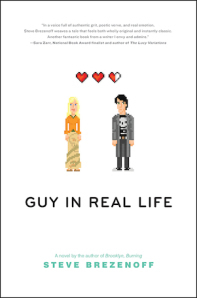Kelly Barnhill's Blog, page 5
October 11, 2014
IT’S BOOKFEST DAY!
*runs down stairs in jammies*
*looks under the bookshelf to see if the Bookfest Fairy has arrived*
(not yet, my pretties, but soon)
Today is the Twin Cities Book Festival, which is one of my top ten favorite things about living in the Twin Cities. I love the booths, I love the conversations, I love the dedication to Children’s Literature, I love the bowls of candy being handed out like, well, like candy. I love finding out what independent artists are working on. I like seeing the latest from letterpress poetry publishers and indie comic producers. I love the myriad of manifestations of story and language and image and art. I love everything about it.
I will be presenting at 11:00 at Middle Grade Headquarters with Our Dear Will Alexander and his Fine Novel, Ambassador. We will talk about our books, and the books we loved and space and time and magic and adventure. And perhaps pie. (I’m just kidding. I won’t talk about pie, I promise.) But I will answer your questions. Even the impertinent ones.
Stop by and say hello if you can.
Filed under: Uncategorized Tagged: Literature, Minnesota, writing communities


October 9, 2014
In Which the Only Way Forward is Forward.

I have this bad habit, as a writer. I erase. All the time. I’ve written about this, actually, and bragged about it too. My approach to revision: Select All; Delete. I have done this. Many times.
And I’ll use evocative language to describe it – something about standing at precipices, or burning the fields to make them bear, or pulling up the boundary fences and standing in the center of wild, limitless space. I’ll say something about the dust of supernovae giving rise to brand new galaxies and that nothing is ever really lost.
And I stand by it, mostly. But I’ve never actually told the whole story. Because sometimes, my crushing need to rid myself of chaff and weak sentences and imperfect paragraphs prevents my stories from moving forward. I write; I go back; I fuss; I erase; I re-write; I fuss; I erase; I re-write; I fuss; I erase. And the book gets stuck. And I become much more unpleasant to live with (my family denies that last bit, but I think they are just being nice).
Erasing can be empowering, but it can be a trap, too. I have been trapped. Ask anyone you like.
So this next book is erasure-free. I am trying it out as an experiment. I am not allowed to erase anything until I type “The End”. I am walking on a long, straight road, and I am not looking back – not for a second. Each day I write. Each day I bring the story a little further along. Each day I take notes on my little novel-progress notebook. What I noticed that writing day. What questions I have for my characters. Ideas to work in later. Things that I know I’ll have to fix, but I’m not going to right now.

This is me. Right now. Except with a different hat.
And there is something to it, actually. This forward motion. I have absolutely no idea if the book sucks. I have absolutely no idea if my sentences are working. I have absolutely no idea if the texture of the language works rhythmically – if it feels good in the mouth and ear (this is something I put a lot of time into, actually. My books are read out loud somewhere on the order of a hundred times before I turn that sucker in.) Of course, this is not to say that I won’t erase later, or that I won’t spend hours and hours on a single sentence. What it does change, though, is this stage of the game. This process of invention and discovery. And I have to say, I’m having a pretty good time.
No. I’m having a great time.
I had a pretty good idea about the shape of this story before I began, but even now, thirty thousand words in, I’m encountering all kinds of things that have surprised me. For example:
1. There is a convent of nun-assassins who are both crafty and terrifying. Their needlework is as menacing as their swordplay.
2. There is a stone that looks like a stone but is actually a door.
3. The verses of ancient poetry are carved into the living trunks of ancient trees, spiraling around and around from the ground to the upper branches.
4. Sometimes, carpentry is a better career choice. Not everyone is cut out to be a despot, after all.
5. Paper birds can be used as weapons.
6. Magic, like puberty, can hit a person like a runaway garbage truck, and can be just as confusing, disorienting and undignified.
7. Sometimes we lie to the people we love. It doesn’t mean we don’t love them. But it can make them not love us.
8. Gout is the most unpleasant of maladies.
9. Confounding architecture is ridiculously fun to write about.
10. Dragons are the biggest scaredy-cats in the whole wide world.
As I said: It might be terrible. It likely is terrible. And maybe I can un-terrible it later, and maybe I cannot. But this freedom I feel right now – freedom from worry, freedom from fussing, freedom from beating myself up for not being perfect, freedom from casting a pale eye on the work I had done thereby slowing the work that I will do – well. It feels pretty great. And while clearing the decks on a manuscript and starting over sometimes feels wild and free and unencumbered, there is something to the forward motion as well.
There is no looking back. There is nothing behind me. There’s only my feet and my breath and my swinging arms. There is only my eyes on the mountain ahead. And clear, blue sky.
Filed under: Uncategorized


October 8, 2014
Double Entendres: the Fourth Grade Boy Edition
In the carpool today, my short-sleeve-shirted son shivered in the back seat next to his two neighborhood buddies. It was forty degrees. He refused to wear a jacket. He refused to wear pants. It was a struggle to even get that child into shorts (“Why aren’t underwear used as regular clothes, mom,” he asked. “Just give me one good reason.”)
“Leo,” I said. “I want you to check the lost and found today for the sweatshirts and coats that have mysteriously vanished from our house.”
“Oh, I have them,” he said. “In my locker. And in my bag.” He was shivering.
“Well,” I said. “Grab a hoodie and put it on.”
The other boys, normally a tangle of chatter, fell suddenly silent. They stared at me open-mouthed.
“Dude,” the red-haired boy side-mouth whispered to Leo. “Did your mom just say ‘woody’?”
And the boys started to choke on their own laughter.
“What?” I said. “No. I certainly did not say-“
“LEO’S MOM SAID WOODY!” one of the blondes wheezed.
AND THEN THEY ALL DIED. They died and they went to heaven and they got booted out and were sent back to their bodies where they died again. They were weak with laughing. They were like hyenas trapped in the grip of boa constrictors. They laughed to death again and again.
“I CAN’T BELIEVE SHE EVEN KNOWS WHAT WOODY MEANS,” one of the other blondes gasped as he was slowly re-asphyxiated with hilarity. But then he came back to life. “Wait,” he said. “You do know what it means, don’t you?”
“Let’s watch Indiana Jones,” I said, popping the ancient tape into the more-ancient minivan VHS player – saying a silent prayer, once again, that the dumb thing still worked.
Because it was KILLING ME to keep a straight face. I might have died of it. I might already be dead.
Filed under: Uncategorized Tagged:

October 7, 2014
On Writing Prequels: discovery, recovery, and the art of knowing.
This summer, I was given a challenge: write a prequel story to my new novel in three parts, to be run on three different blogs, one week apart from one another. This challenge I blithely accepted, asking myself what could possibly be difficult about this?
Nothing, I thought.
Everything, I discovered.
So I started writing somewhere around eight stories, all of which were utterly, utterly terrible. After living with these characters for so long, after knowing the timbre of their voices and the exact shape of their eyes, and the touch of their hands as they slid into mine and held on tight – I felt like I couldn’t find them when I sat down at the page. I felt like I was standing in the middle of an enormous cavern – damp, cold, and completely dark. I called their names – Ned! Aine! Sister Witch! Ott! Bandit King! Madame Thuane! Even that ridiculous Brin! – and nothing called back. Only the echoing sound of my own voice, over and over and over.
And I wondered: How do fanfiction writers do it? Seriously how do they? Because that is what I was writing. I wrote fanfiction to my own durn story. And it was hard. Writing a novel is ever so much the process of discovery – we find each character fully fleshed and formed and we just write down what we see. We meet them; we get to know them; we love them like family. But writing a tie-in story was much more the process of recovery. I had to take what I knew of these characters, make assumptions, ask questions, and dig. It was like reconstructing the personality of a recently-deceased grandmother, based on some newly-discovered letters.
Actually, that’s exactly what it was like.
Anyway, eventually I figured out which story was going to work out of my pages and pages of fits and starts, and I found my way through. And I liked it. I liked it a lot, actually. And I got to meet new characters. Interesting characters. And I got to look at the world that I lived in from a completely new direction – like discovering cool neighborhoods in a city where you used to live that you had no idea were there at all. And I was able to learn things about my characters that I did not know before. And that is the best part of my job: digging, sorting, discovering, making connections, collecting artifacts, finding new ways of knowing. I love it, really.
The nice folks at Bookshelves of Doom, Jessabella Reads and My Friends are Fiction were generous enough to host the three sections of my story. I have compiled all three sections into one page and put it up on my website: here. I hope you enjoy it.
Filed under: Uncategorized Tagged: Algonquin Young Readers, fan fiction, short stories, The Witch's Boy, writing


September 30, 2014
And Now We Are Ten.
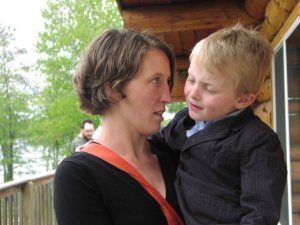
“Awww, Mom!”
Ten fingers and ten toes.
Ten rules broken before breakfast.
Ten new gray hairs on your mother’s head.
Ten reasons why the sky is up and the ground is down.
Ten ways to avoid homework.
Ten routes to climb to the roof.
Ten legos in my running shoes.
Ten handprints on the hallway walls.
Ten baseball craters on the minivan roof.
Ten reasons why we should snuggle this second.
Ten games to play in front of the fire.
Ten tricks on a fast-moving bicycle.
Ten heart-attacks (mine, of course.)
Ten kinds of pie.
Ten trips to emergency rooms.
Ten jokes in less than a minute.
Ten stars in a love-struck eye.
Ten new wrinkles on my brow.
Ten thousand sleepless nights.
Ten million stories in my head.
Ten ways to say I love you. (And ten times ten times ten times ten times ten.)
Happy birthday to my son, a Most Marvelous Boy. I love you ever so much more than Ten.
Filed under: Uncategorized Tagged: birthday, parenting boys


September 26, 2014
Saturday! At Wild Rumpus!
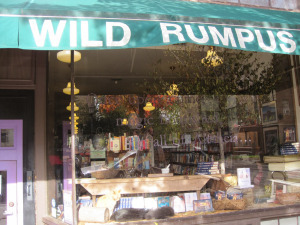
YOU GUYS! Tomorrow, September 27, I will be reading at Wild Rumpus Bookstore – one of my favorite places on earth. I’ll read from the book, answer your questions, and eat cookies. I had this mad scheme to make cookies in the shapes of wolves, but for the life of me, I couldn’t find any wolf shaped cookie cutters. So. Chocolate chip cookies instead. And perhaps we will discuss the nature of pie. Or Pi.
In any case, I hope you can come! 1:00. There will be chickens! And cats! And ferrets! And birds! And books! Hooray!
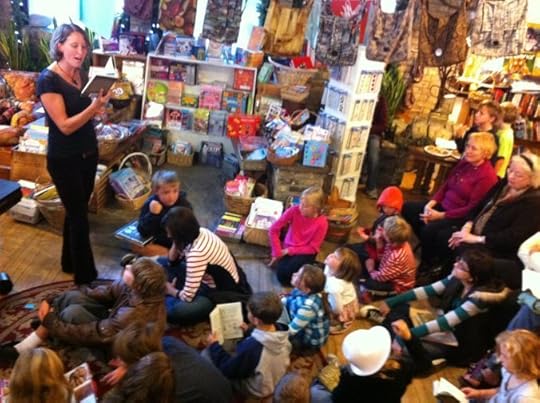
Filed under: Uncategorized Tagged: Algonquin Young Readers, BOOK PARTY!, Middle Grade Novels


September 25, 2014
On Slowing Down
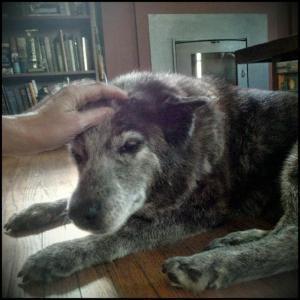
A lot of people have contacted me recently, offering hesitant inquiries regarding the health of my dog, Harper. The hesitation is understandable. She is, after all, very, very old. And every day she gets older.
The good news is that she is still very much alive, and still enjoying herself on most days. She has been in our family now since 1998, when she came to us, filthy and scraggly and thin and sick, from the street. At the time, the vet guessed that she was somewhere between 3 and 5. Which means she is now . . . old. Really old. Like, I’d have to do math to figure it out.
She can’t move as quickly as she used to, and can’t see as far as she used to, and sometimes she gets anxious and nervous because the world doesn’t feel the same – and that can be scary. We had a pretty nasty scare with her this summer. Part of inviting a former street-dog into your home and family, is that some of that street-dog-scrappiness still remains. She is, was, and will be, super gnarly. And I love that about her. This summer – on July the first, to be exact – Harper got it into her head to self-surgery a small tumor that had been on her bottom for quite some time. The doctor theorizes that perhaps it had gotten a small cut on the edge, allowing for bugs to get in (I know. Gross. And you didn’t even have to see it), but in any case, it got uncomfortable, so she removed it.
With her teeth.
And she nearly bled to death.
This all happened right before my darling husband and I – after fifteen years of wedded bliss – decided to take our honeymoon at long last. Which was difficult to do with a beloved dog on death’s doorstep. The next few weeks were expensive and exhausting (and did I mention expensive? good lord, I shall be paying those vet bills forever), but Harper, being Harper, despite the blood loss and the shock, despite the infection and the maggots and the open wound – well? She rallied. She healed. You can take the dog out of the Street, but you can’t take the Street out of the dog. And now she’s doing great.
However.
There is no doubt that she is slowing down. It takes a long time for her to go from standing up to lying down and back again. She sleeps more than she used to. While she still finds ways to sneak out of the fence, her solo excursions are far from wide-ranging – she goes down the block and comes back, collapsing in a heap on the front stoop until someone notices her. She likes to lay on my feet, reminding herself that I am still here. She eats more slowly and drinks more frequently. Her walks are slow and thoughtful and plodding.
And there is something to this notion of slowing down. Because it’s not just Harper slowing down. I have to slow down with her. And she is teaching me how to do it.
There, I have learned, an incredible beauty in moving slow. We can know the Infinite in stillness, in quiet, in standing still.
This summer, we took the kids and the dog and the minivan and the tent to Madeline Island in Lake Superior. And it was wonderful. We slept under the stars and swam in the big Lake and jumped off cliffs into the waves and hiked through the forest. Now, Harper loves hikes. Always has. This particular hike was four miles, and while she kept up pretty well for the first three, she slowed WAY down in the last.
The kids and my husband kept their regular paces, and quickly disappeared into the green, and Harper and I were alone. She didn’t complain, and she didn’t seem to be in any distress. She was simply walking very, very, very slowly. And so was I.
There is a meditative quality to walking very slowly through the forest. You are aware in the minute changes in the texture of the ground from footfall to footfall. You watch the dappled light wobble and wave each time the wind blows. You unpack the language of birds. And bugs. You listen to the rhythm of the waves hitting the cliffs – swell, crash, bubble, swirl, swell, crash, bubble, swirl. You listen to the creaking wood and the hum of insects. You notice that each tree produces a particular sound. You notice that moss squeaks when you walk on it. You notice that there are infinite shades of green and infinite shades of brown and infinite shades of blue. The water seems boundless – but it is not. This life feels boundless – but it is not. Each step my dog takes is one of a finite number of steps. As are mine. And yours. You notice the strawberries hiding under green leaves and the gathering of blueberries across the peat bogs and the deep shine of the raven’s wing – the one who shouts at you when you come too near to his tree. Harper would pause from time to time, looking expectantly at me for a treat. She always deserved it.
By the time we got back, the kids had already gone with their dad to the water, and Harper and I were left alone. I could have gone swimming, I suppose, but instead I laid down on her blanket and she put her head on my belly. She slept while I stared at the sky. The weight of her – hot and firm and heavy – seemed so stable to me, so sure. But that was an illusion, too. One day she will be gone. And there will be nothing left – nothing but memories.
I walk with my dog every day. We don’t go very far, and we don’t go very fast. Usually, we just go into the fields behind my house. We look for Great Blue Herons – or I do anyway. She pretends to look for rabbits. We slowly make our way to the old cottonwood tree by the creek. She sniffs the tall grasses. She sniffs another dog’s poo. She is startled when the red winged black birds fly too close (they always fly too close). I notice the sponginess of the ground and the sound of the traffic. I notice the smell of the creek. I notice the conversations of the bikers going by on the paved trail on the other side. I notice the gurgle of the water as it slowly makes its way to the sea.
We spend so much time rushing. We spend so much time trying to fit every blessed thing into the day. We spend so much time worrying – about the mortgage, about how are kids are doing, about our careers, about why I can’t fit into those jeans, about the company that’s coming in an hour, about how to get the kids to their nine million activities, about the bank account, about the leaky faucet, about the lists that our books are and are not on, about numbers and deficits and the ever changing goal-posts indicating our success as a human being. We spend so much time trying to outrun failure.
Today, I went for a longish run – eight miles initially, but at mile seven, I simply could not go on. My asthma was kicking up, and I couldn’t breathe. So I stopped and watched the creek. The leaves are just starting to change. The greens have paled so they may give way to scarlet or tangerine or gold. Their edges are browning like bread. And so I walked. Very, very slowly. I walked the way Harper walks. I breathed through my nose – mud, dust, leaf mold, algae, blossoms emitting their last breath of sweetness before collapsing to the ground. The world smelled green and gold and delicious. Autumn offers itself to us like a feast, and we gorge ourselves mightly, before the world is shoved unceremoniously into the freezer. I listened to the sound of my feet. I listened to my breath as it unkinked itself – wheeze to whine to rattle to sigh to quiet breathing. I missed my dog. She was waiting for me. Sleeping again. My little dreamer, curled up in my office. Dreaming, dreaming, dreaming, dreaming.
My dog is doing well, all things considered. We love her every day. We will hang onto her until we can’t. That is the way of things.
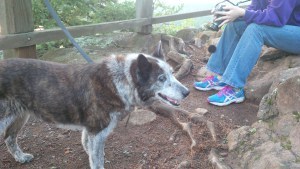
Filed under: Uncategorized Tagged: aging, death and dying, Kids and dogs


September 23, 2014
Today. In the carpool.
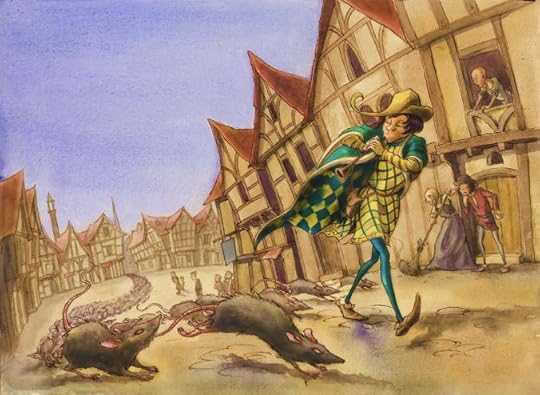
This morning, the boys in the backseat of the minivan turned their conversational prowess to the subject of rats.
“I heard,” said the redhaired boy with an air of both authority and gravitas, “that if they are hungry enough, they will eat your face.” He let that sink in. “Your face,” he added, for emphasis.
“I heard,” my son said, “that they ate everyone on a pirate ship. Like a swarm of rats. Are there swarms of rats? I don’t know what you call a lot of rats. But they ate everyone. Pirates. Real pirates. And then they swam. ACROSS! The OCEAN! And found another pirate ship. And they ate them too. Real pirates. And I read that in a book. So it’s true.”
“Not everything in books is true,” I piped in. I don’t think they heard me.
“I heard,” said one of the blondes, “that a bunch of rats? One time? Swam all the way? To Antarctica? And they ate a penguin. Or maybe it was a penguin. Maybe it was a leopard seal. Are there leopard seals in Antarctica?”
“They couldn’t eat a leopard seal,” my son Leo said. “That is insane. Besides. Leopard seals have leo in them. So. Maybe it was a killer whale. Could rats eat a killer whale?”
“They’re called orcas,” the redhaired boy said.
“Your called orcas,” said one of the blondes.
“Your mom is called orcas,” said – oh god. One of them. I couldn’t tell which. In any case, I decided it was time to intervene.
“Rats are gross,” I pronounced. Because it is true.
“Well . . . ” Leo equivocated.
“There is no well. Rats are gross. They sleep on their poop and lounge in their pee. Their teeth are yellow and their feet look like aliens and their tails are too gross to be allowed. They are sneaky and evil and would eat us all if they felt like it, but they don’t have to feel like it because most of the time we are just garbage cans with legs and they get enough food from our stupid trash. Also? They eat trash. Gross.”
I might have strong feelings about rats. They may or may not haunt my dreams.
“They’re not, like, the grossest,” one of the blondes – a boy named Ozzy – said.
“Oh yes they are,” I said. there is nothing grosser.
“Well,” Oz said. “I am way grosser than rats.”
“My darling boy,” I said. “You are not anywhere near as gross as a single rat, much less a nest of rats. You are not even in the same league.”
“That sounds like a challenge,” said Oz.
I pulled the car in front of the school and the kids started tumbling out of the minivan.
“It isn’t a challenge, dear. It’s just a fact. When it comes to rats -“
“Well,” he said as he hopped out of the car. He turned to me and bowed with a flourish. “CHALLENGE ACCEPTED!”
“No. It’s just like -“
And the mob of miscreants from the barnhill minivan all started rubbing their hands and cackling with glee.
And I would like to take this opportunity to apologize to their mothers in advance. I have no idea what’s in store, but I’m pretty sure it’s going to be gross. Possibly grosser than rats.
I have been incredibly delinquent in blogging lately, and it’s silly of me, because THINGS HAVE BEEN HAPPENING! Good Things! Exciting Things! And I have much to say in the very near future. And I need to be blogging more regularly, because the fact is, it’s super fun.
I hope all of you have been well, and that your projects are going swimmingly and your families are healthy and your work is fulfilling and you are all on tracks for winning Nobel Prizes in Being Awesome. Smooches to all!
KB
Filed under: Uncategorized Tagged: carpool, manic mama, raising boys


June 25, 2014
Writing Process Blog Tour (#MyWritingProcess)
Well, it’s finally happened: my blog has been memed. (Can meme be a verb? And if so, is it transitive or intransitive? And is it irregular?)
Anyway. I have been tagged by the prodigiously esteemable Mr. William Alexander, author of Fine Fictions and Sundry Stories, and an all-around Fine Fellow. You can read about his process here. You can also browse his books – the National Book Award winning GOBLIN SECRETS , for example.
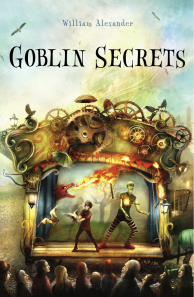
If you haven’t read it, I insist you do so instantly. It is a wondrous strange little beauty, filled with intricate machines, beautiful baubles bent on your destruction, bravery, loyalty and dread. I just loved it. He writes short stories as well, and I’m always happy to encounter a new one. His new book is this:
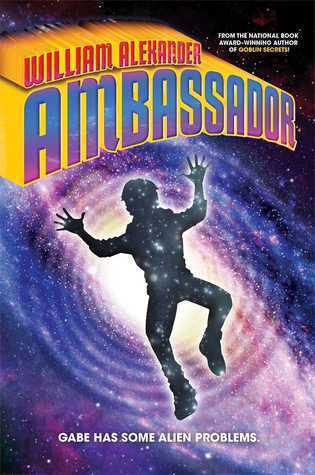 Middle grade science fiction in the vein of A Wrinkle in Time? Great Scott. Sign me up.
Middle grade science fiction in the vein of A Wrinkle in Time? Great Scott. Sign me up.
And since this is a meme, which means that I must pass it on like a game of Hot Potato, I do hereby name Mr. Steve Brezenoff, a writer whose books are both incisive and compassionate, who balances the highbrow and the lowbrow with deft skill and ease, and who manages to force us to remember the ache and confusion and agony of the teen experience while reminding us of the joy as well. His newest book is Guy in Real Life, and I insist that you read it at once.
Anyway. The meme. I hope it makes sense. If not, don’t worry about it. I rarely make much sense.
Question the First:
What Are You Working on Right Now?

Several things. My editor has a copy of my new book, The Boy Who Loved Birds, on her desk right now, and I am in a place of restless waiting for notes. This is a common phenomenon for writers: restless waiting. It is, I’ve been told, particularly unattractive. Oh well. I’m also finishing up a new book called The Sugar House - a Hansel and Gretel retelling set in Minneapolis. I very much enjoyed writing it. And then I’ll write the next book called The Girl Who Drank the Moon – which has a foundling child, a mad woman in a tower, a five-hundred-year-old witch named Xan, a poetry-quoting swamp monster named Glerk and a Perfectly Tiny Dragon with delusions of grandeur (his mother, hoping to boost his self-esteem, convinced him that he was actually a Simply Enormous Dragon trapped in a land of giants). I am rather excited about it.
Question The Second:
Why Do You Write What You Write?

You know, my husband asks me this all the time. Or more specifically: why don’t you write best selling series fiction that makes millions so we can retire and then you can hire recent graduates to crank out your novels on your behalf like James Patterson? And, to be fair, that is an excellent question. Alas, I can only write what interests me. I write strange fictions because I am interested in strange things. I endeavor to write beautifully because I delight in beautiful things. I write creepy stories because I enjoy the inward shiver of the macabre and the unsettling tale. I write stories about childhood because childhood interests me – how we become, how we find our feet, how we build ourselves into the people we will be, how we shape the world around us. I write what I write to amuse myself. I write what I write to heal myself. I write what I write as messages in a bottle to the lonely, hurting child that I used to be. I write for my kids. And my future grandkids. And the kids in the neighborhood. I write to share the oddness inside me with other people.
Sometimes I do all of these things at once.
Question The Third:
How Does Your Work Differ From Others in its Genre?
Oh good lord. I have no idea. Honestly, the notion of genre in general makes me itchy. I don’t like putting firm categories on art, and feel frustrated with the increasing balkanization of literature. Since stories, once absorbed into the Self become part of our internal landscape and our external mapping – since they, once read, become seamlessly integrated in the mind of the reader (and I mean capital-M Mind) they are forever interacting and communicating with every other story that the reader has read. Which means that A Wrinkle in Time is in a lifelong conversation in my brain with Little Dorrit. And The Odyssey. And Anne of Green Gables. And The Sandman. If it were up to me, all fiction would simply be fiction, and that would be that.
I think I’ve digressed.
Anyway, how does my book differ from – not other books of its supposed genre but any book at all? Simple. I wrote mine. Someone else wrote theirs. When we sit down to work, we bring the particularities and peculiarities of our specific life experience. My family. My fears. My hopes. My nightmares. My faith. My loss of faith. My travels. My mental health. My obstacles. My reading life. My bare feet on the green grass and my fingertips in the warm mud and my lungs taking in the air around me and my eyes widening at each new blessed wonder. My books are different because I am different. You see?
Question the Fourth:
How Does Your Writing Process Work?

Not very well, I’m afraid. I am a chronic destroyer of my own work. My newest book, The Witch’s Boy, was fully erased and given up on, I’d say eight times. I slash and I burn, and my soul burns with it. So this is how it works:
1. I get a notion of a story – sometimes it is a little knot of text that occurs to me while I’m running. Sometimes it is a very clear idea for a character. Sometimes it is a very particular moment. In any case I will will not start the story. I will just start thinking about the story. For a long time. (To put this in perspective, The Girl Who Drank The Moon - the story I’ll be starting this summer – I have been thinking about for about two years. The book I write after that - Dispatch from the Hideous Laboratories of Doctor Otto van Drecht - I’ve been thinking about for three years.)
2. I get a box. I’ll put scraps into the box from time to time – little note cards, ripped out pieces of paper, articles, pictures, bits of string that I can’t remember what I was thinking of putting it in there, but there it stays. Baubles. Notions. Knick-knacks. Whatever. Things accumulate in the box.
3. I start to write. Longhand. I am a big believer in writing longhand. The problem with this is that I am not very organized and am prone to losing said notebooks. For The Sugar House, I have lost my notebook at the playground, at my kid’s school, at a coffee shop, at the gas station and in a public restroom. Fortunately, each time I’ve lost it, I’ve found it again. So far. But the future is wide and wild and scary and anything can happen.
4. I give up on the longhand. Eventually, the story starts moving in two directions at once, and I need to fix the beginning in order to re-do the end. Or I am just moving too quickly to be able to keep up. So far, I’ve only been able to maintain my longhand-only insistence for about 3/4 of a draft. When I start to move to the computer, each section goes into depth and breadth. So fifty pages in the notebook often translates to ninety pages on the computer. Each sentence is a jumping-off point.
5. I erase everything. I give up. I wonder why I ever started writing in the first place. I say mean things to myself.
6. I confess my erasing to my writing group who tell me to knock it off already. I get back to work.
7. Steps five and six repeat a bunch of times.
8. I read the book out loud. I realize it’s not as bad as I thought. I read loudly, dramatically, and with gusto. My neighbors think I’m nuts. They are not wrong. I edit as I read. I repeat this process about ten times.
9. I send it out. And I collapse:

10. And the process starts over.
Filed under: Uncategorized Tagged: #mywritingprocess, art meets life, Childrens literature, the writing process, writing fiction


June 12, 2014
Feral Children
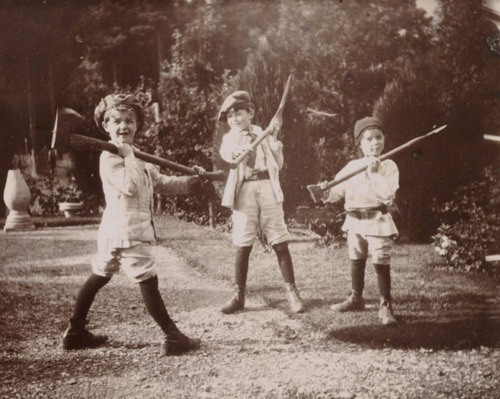
A typical scene on my block.
The other day, I had my writing group over for dinner so they could eviscerate discuss my new book The Boy Who Loved Birds, which I am still considering erasing forever. It was one of those perfect evenings in Minnesota – pleasantly warm with a gentle breeze, all blossom and fragrance and birdsong and green, green, green, green. My back yard bumps right out onto park land, so from the table on the patio, you look out onto a green slope and a green field and a tangle of woods and a swollen creek with a charming footbridge arching prettily over the water. If you look up idyllic in the dictionary, I’m pretty sure it says Kelly Barnhill’s goddamned patio.
Anyway, somewhere between the tortellini and the wine and the orange popsicles, a scene unfolded before us – familiar enough to me, but my comrades were stunned by it. A troop of shirtless boys – a couple with hand-torn strips of cloth tied around their heads in makeshift headbands – came tramping down the hill, passing by the yard and heading over to the fallen down willow tree by the water’s edge. The boys in my neighborhood call it “The Fort” or “The Village”. The girls call it “The Fairy Tree”. Obviously, the girls have the correct name, but we try not to make the boys feel bad about it.

Two of the littler girls trailed behind. To the untrained eye, it looked like they were tagging along. For those of us in the know, it is clear that they are there to a.) be in charge and b.) collect evidence for future tattling, blackmailing or politicking. They stopped on the hill to roll down it – boys and girls together. When they got to the bottom, they stood as if this was the most normal way possible to travel downhill, and proceeded to march across the field.
“Hey kids!” I called out to them.
“Hey Kelly,” the kids called back. Or some of them did anyway. My son ignored me entirely. They tramped by and disappeared into the green.
My writing group turned to me.
“You live in a damn Norman Rockwell painting,” they said.
“Is it like this all the time?” they wondered.
And the thing is? On my block, yes. It is like this all the time. Kids wander this way and that – from back yard to tangled wood to alley to bridge to riverbank to field to garage to basement to somebody’s kitchen to back yard and back to the field. They travel on bikes, on scooters, on roller blades, on skateboards and on foot. When the field floods they bring out paddle boards or kayaks. Sometimes they try to wrestle giant carp swimming in the shallow waters covering the grass. From time to time, parents will text or call with the whereabouts of this child or that child. If I am looking for my son, for example, I’ll check with the parents across the street, and if they don’t know, I’ll ask the parents next door to them, and if they don’t know I’ll check with the family down the block, and if they don’t know, I rely on the fact that I can call out really really loud (it’s one of the perks of being a former singer – I project) and eventually my son hears me and comes home.
The kids here. They run wild. It is good that they run wild.
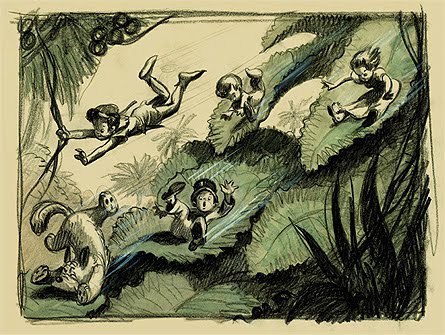
“Do you want to just tell your kids that they’re not allowed to grow up to be messed up? Do you tell them look at what we have provided for you! It’s perfect!”
Unfortunately, even the most idyllic childhood doesn’t rescue us from having our own dark nights of the soul. Pain – physical, emotional, spiritual – is inevitable. We were born broken. We will die broken. We will be broken along the way. However, I like to think that this little kid paradise tucked into Minneapolis will give them something special as they muddle their way through the perils of childhoods into the skins of the men and women that they will become. I hope that the wild children that they are right now remains an essential part of who they will be. I hope that, even when they are old, that their souls are still muddy, grubby, grass-stained, sweaty, hard-muscled, bright-eyed, and still utterly, utterly wild.
One of the benefits of the feral childhood – because, let’s be clear. That’s what they have. Sure they brush their teeth when they are told and do their homework on command and clean their rooms when under duress and come in for dinner after only the seventh or eighth warning, but they are far from domesticated - is that they have this opportunity to claim the world that they inhabit. This is a powerful thing for a child – something unavailable to them when they’re at school or baseball practice or church or grandma’s house. When they roll down the hill and tramp across the field, there is no rule that they do not negotiate and agree on among themselves. There are no clocks or watches. There are no gold stars or percent marks or work books. Heck, there aren’t even shirts half the time.
In the green world, there is only now.
In the green world, there is only us.
Here are my hands, the children say. They belong to me.
Here is the grass, their voices shout. It belongs to me as well.
Here is this stick. It was made for my hands. Here are my arms. And my muscles. They were made to wave this stick around. There is no truth but motion. There is no rule but play. There is no reality outside of myself and this stick and this mud and this tree and this water and this green. This is the only world that matters.
Here is this field they say. It belongs to us. Here is the creek. It also belongs to us. And so does the sky and everything under it. How good – how very good it is to be THIS boy. And THIS girl. This very one.
There is no greater thing on earth than a child in motion. Bless you, my children. Bless all of you. May you own the world forever.

Filed under: Uncategorized Tagged: Childrens literature, parenting, parenting is poetry, peter pan, raising kids



